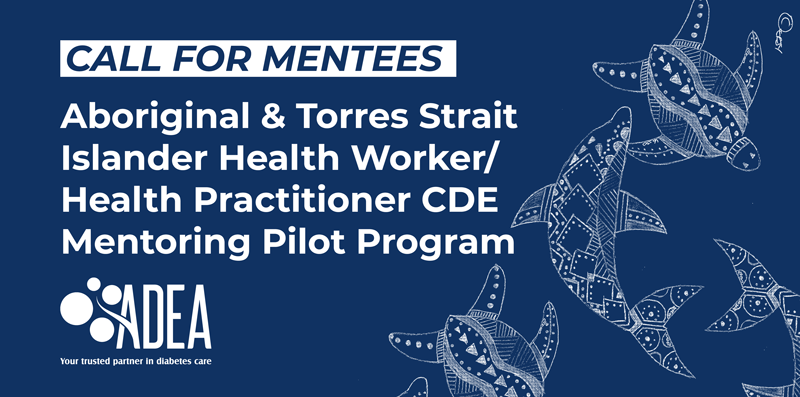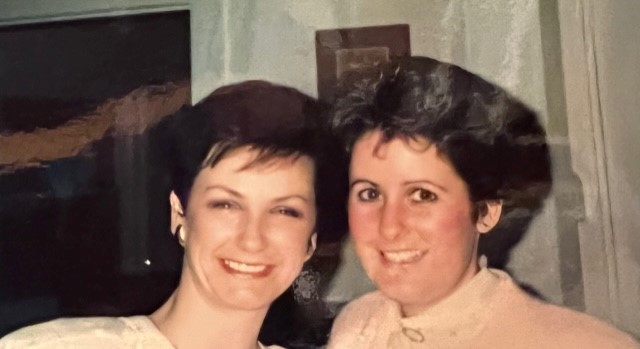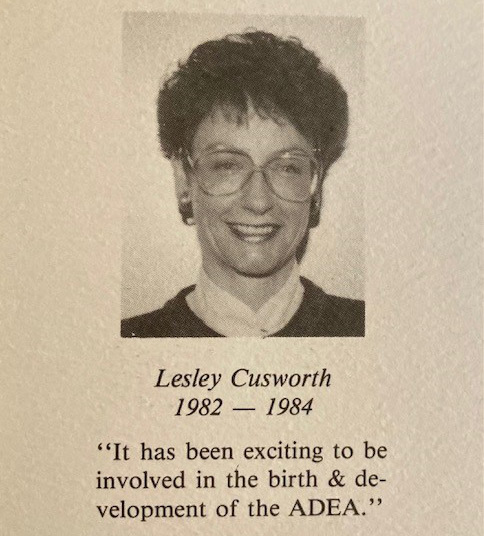Already a member? Click here to login.

Australian Diabetes Educators Association
Already a member? Click here to login.

Already a member? Click here to login.

ADEA is currently looking for mentees who would like to join our Aboriginal & Torres Strait Islander Health Worker/Health Practitioner CDE Mentoring Pilot Program. As a mentee, you will be learning more about diabetes care and education, and the pathway to becoming a Credentialled Diabetes Educator (CDE).
Diabetes is one of the most significant health issues that Aboriginal and Torres Strait Islander communities face. Engagement of the Aboriginal and Torres Strait Islander health workforce is essential to improving diabetes prevention and management.
Aboriginal and Torres Strait Islander Health Workers and Health Practitioners receive limited training in diabetes within current vocational education training packages. The availability of quality post-qualification education opportunities is particularly important for this workforce.
We are calling for all Health Workers and Health Practitioners across Australia to take up this opportunity to join the Aboriginal & Torres Strait Islander Health Worker/Health Practitioner Mentoring Pilot Program.
During the 12 weeks of the Program, you will receive support and education from your mentor, helping you to assist your clients in managing their diabetes. Additionally, you will learn about further studies and scholarship opportunities to assist you in becoming a Credentialled Diabetes Educator (CDE) yourself.
If you would like to join or learn more about the Program, please contact Leonie Yasso at Leonie.Yasso@adea.com.au by 25 February 2022.
The artwork for the Aboriginal and Torres Strait Islander Health Worker/Health Practitioner CDE Mentoring Pilot Program has been generously provided by emerging artist Elron Yasso who was born on Juru land. You can learn more about the artwork here.
This project is funded by NDSS.
In loving memory of Lesley Cusworth, 2 September 1952–12 January 2022 (Adelaide)
by Victoria Stevenson RN CDE
I first met Lesley at the International Diabetes Institute in Caulfield (IDI), Victoria. She was buzzing around ensuring everyone was organised for the day, chatting happily to everyone in sight and welcoming newcomers; a delightful lady with whom you immediately wanted to rub shoulders with and get to know.
Lesley was an outstanding nurse who completed her training at Prince Henry’s Hospital and midwifery at Melbourne’s Royal Women’s Hospital. In the late 1970s, she commenced work as a diabetes educator at the Diabetes Foundation of Victoria (now Diabetes Victoria) with Gwen Scott. In 1980, Lesley moved to the Diabetes Centre at Southern Memorial Hospital, Victoria, which shortly after became the International Diabetes Institute where she worked with Professor Paul Zimmet AO and Dr Matthew Cohen.

Lesley Cusworth with her dear friend and colleague Christine Crosbie
Lesley helped establish and shape education services at IDI and encouraged educators to be open-minded in their work to benefit people with diabetes. Self-blood glucose monitoring was still very new in the late 70s and early 80s and Lesley spent many additional work hours travelling all over Victoria with Matt and Paul teaching other health professionals and encouraging them to integrate this new tool into their practice and patient care.
As a result of this outreach work and conversations she had with interstate colleagues, Lesley and others realised that many people around Australia were working in this new field of diabetes care and education. Clearly, there was value in sharing experiences, discussing cases, and pondering questions and challenges to better support health professionals and people with diabetes.
Paul Zimmet remembers Lesley as a fine and inspirational health professional with a vibrant personality, lots of enthusiasm and creativity, a wonderful sense of humour, and strong leadership qualities. Lesley was held in very high esteem by colleagues and patients. Paul credits Lesley amongst others for helping him establish the IDI as a National and subsequently International Centre of Excellence in diabetes education and care.
In 1981, the Australian Diabetes Educators Association (ADEA) was formed with an initial membership of 248, comprising a cross-section of health professionals, including some diabetes industry representatives.

Lesley Cusworth in an early edition of the ADEA newsletter
Following her first 12 months of actively serving on the ADEA Steering Committee, Lesley helped others in developing the constitution and the Rationale Aims and Objectives of the ADEA. Lesley was then elected as the Inaugural President of ADEA in 1982. Key developments from her two years in this role included:
In September 2001, during the Annual Scientific Meeting at Conrad Jupiters on The Gold Coast, ADEA celebrated turning 20. Lesley was the invited guest of honour and spoke of the beginnings of ADEA. As part of the celebrations, Lesley acknowledged and congratulated ADEA on its achievements. She then joined past Presidents and others in cutting the amazing 20th-anniversary cake.

Lesley Cusworth cutting the ADEA’s 20th-anniversary cake
In the February 2002 edition of the ADEA Magazine, Lesley further reflected on her time as President. Lesley highlighted the following accomplishments as some of her main contributions:
When Lesley was asked about the main things she learnt from her time as President, her reply spoke of the power of working together as a team to facilitate and enable many things, and the passion and commitment of those involved that helped to communicate a vision for ADEA. Lesley felt that the creation of positive, long-lasting relationships and working together willingly created something of special significance.
After leaving IDI, Lesley, her husband Bob, and their family moved interstate and then overseas for a few years, for Bob’s work. Lesley went on to complete further studies. In 2006, she retired from Burnside Hospital, SA, after many successful years of working in a diverse number of clinical and managerial roles. Lesley had been much admired and respected by all at Burnside Private Hospital. In later years, Lesley enjoyed and excelled in volunteer work with the Guide Dogs of SA/NT.
Lesley was devoted to Bob, their three daughters, and five gorgeous grandchildren. She had many friends, both personal and professional, and enjoyed spending time with them.
Lesley was a true professional who maximised every opportunity to progress the development of ADEA and in doing so made a significant contribution to diabetes care and education in Australia. This was recognised in 1984 when she delightedly received her ADEA Honorary Life Membership Award. We are thankful that Lesley helped shape and forge a path for us all.
It was an honour to have known Lesley.
Victoria Stevenson RN CDE
We are currently looking for CDE mentors who want to contribute to the health of Aboriginal and/or Torres Strait Islander communities through our newly created mentoring program. The Aboriginal and Torres Strait Islander Health Worker/Health Practitioner CDE Mentoring Pilot Program is a three-month NDSS funded CDE mentoring program tailored to Aboriginal and Torres Strait Islander Health Workers and Health Practitioners.
As a participant of the Program, you will:
This is a fantastic opportunity for you if you:
Applications for this Program are already closed.
If you would like to be part of this pioneering program, please send us your expression of interest by 25 February at 5 PM to ndss@adea.com.au. Please include a current resume and a few words about your relevant experience, as well as your expectations of the project.
Not quite sure if this is for you? We’re happy to answer your questions or supply further information about the Program. For further information, please reach out to ndss@adea.com.au.
Diabetes is one of the most significant health issues that Aboriginal and Torres Strait Islander communities face. Engaging the Aboriginal and Torres Strait Islander health workforce is essential to improving diabetes prevention and management. The Pilot Program aims to improve health outcomes for Aboriginal and Torres Strait Islander peoples who are living with or at risk of developing diabetes.
CDE Mentors who participate in the Program will support and mentor Aboriginal and Torres Strait Islander Health Workers and Health Practitioners working towards their Credentialling status. The Program will enable future Aboriginal and Torres Strait Islander Health Worker and Health Practitioner CDEs to optimally care for and educate their clients in a safe, effective, and culturally appropriate manner, improving health outcomes for people with or at risk of developing diabetes.
This project is funded by NDSS.

As people with diabetes are at higher risk of COVID-19 and associated complications, ADEA’s position is that every person living with diabetes should get the first available vaccine as soon as they are eligible. This increased risk and our position on vaccines for people with diabetes, means that we advise that each CDE follow the advice and recommendation of the Chief Medical Officer, in consultation with their personal doctor, and if they are able, receive the full course of the recommended coronavirus vaccine.

Thursday 16 December 2021
The holidays are a great time to watch some of your favourite ADEA webinars of this year or to catch up on the ones you missed. Here are the 9 most-watched webinars of 2021.
| CPD opportunity: Couldn’t watch a webinar live? You can still gain CPD points by watching the recording on the ADEA LMS and completing the feedback and evaluation form. |
Travis Hall from Abbott is providing an introduction to Libreview including creating a Libreview Practice, inviting clients and navigating to Client Reports. In the second part of the webinar, Laura Zimmerman CDE and Nicole Walker, an Accredited Sports Dietitian, are giving an overview of the AGP report and a before and after case study using an AGP report.
Watch LibreView – Understanding the AGP Report on the ADEA LMS
This webinar will guide you through The National Diabetes Nursing Education Framework and how it has been implemented in a metropolitan hospital.
In session one of the two-part RACGP Management handbook webinar series, Dr Gary Deed takes you through the new sections that are included in this updated edition and significant updates to existing sections of the RACGP Management Guidelines for Type 2 Diabetes.
Watch RACGP Management of Type 2 Diabetes Update: Webinar 1 on the ADEA LMS.
In the Clinic to Cloud Software Demonstration, key staff from Clinic to Cloud lead you on a journey to understand how to get the best out of the software, to make your life in Private Practice easier and more efficient.
Watch the Clinic to Cloud Software Demonstration on the ADEA LMS
In the second session of our webinar series on the Update of the RACGP Management of Type 2 Diabetes, Michelle Robins CDE explains how these guidelines support your role as a diabetes educator and shows key practice points for diabetes educators when engaging with primary care and the wider diabetes team
Watch the RACGP Management of Type 2 Diabetes webinar on the ADEA LMS
This webinar unpacks the diabetes stigma and the impact it can have on those living with diabetes.
Course: Stigma – National Diabetes Week 2021 (adea.com.au)
Learn more about the latest literature on type 2 diabetes and remission. Dr Alan Barclay will discuss the impact of dietary intervention and how some of your clients may be able to achieve remission.
Watch the Type 2 Diabetes Remission webinar on the ADEA LMS.
Learn more about the new features of the Freestyle Libre 2.
Watch the Freestyle Libre 2 webinar on the ADEA LMS
The credentialling process can be overwhelming at times. This webinar will help you gain a clear understanding of both the credentialling and re-credentialling process.
Watch the Credentialling and Re-credentialling webinar on the ADEA LMS
We have more webinars in the works for 2022: Keep an eye on our events calendar to stay up to date.

16 December 2021
Heading for an extended road trip or a long bush walk over the holidays? Make the most of your time by listening to one of the 10 most popular ADEA podcast episodes of 2021.
| CPD opportunity: After listening to an episode, complete the feedback and evaluation form on the ADEA LMS to earn 0.5 CPD points in Category 1. |
Join our host Jan Alford and Professor Richard O’Brien as they discuss how to prevent diabetic retinopathy, the importance of eye screening and early detection, different treatment options, and the role of the GP and CDE in preventing and managing diabetic retinopathy.
What are some of the most used smart apps for diabetes management? Together with guest Cecily Foged, RN CDE, our host Jan Alford breaks down different available apps and what they can do, some of the advantages and disadvantages of using them, and some tips on discussing them with clients.
In this episode, Jan Alford is joined by Accredited Exercise Physiologist and CDE Elise Hoyer. They discuss their insights of practical exercise and diabetes management recommendations for those in middle age living with diabetes and other co-morbidities.
Jan Alford and Accredited Practising Dietitian and Certified EFT Practitioner Renee Hrudicka revisit the great discussion of EFT (tapping) and how health professionals, particularly dietitians, use it in their routine consults.
Guest Jodine Ball joins host Jan Alford for an overview of sick day management. Jodine shares her experience using the Clinical Guiding Principles for Sick Day Management of Adults with Type 1 or Type 2 Diabetes – A Guide for Health Professionals and some practical tips regarding sick day management for those living with diabetes.
This episode discusses eye health, the role of CDEs in eye health and how they can help prevent and manage vision loss. Jan Alford is joined by Associate Professor Peter van Wijngaarden, who, as a founding steering committee member and clinical director, will also discuss KeepSight – a national program for diabetic retinopathy screening that seeks to reach every Australian with diabetes to prevent avoidable blindness.
Every year, Dietitians Australia runs Dietitians Week to celebrate Accredited Practising Dietitians (APDs), who play a crucial role in the diabetes health team. Jan Alford is joined by Robyn Compton, an APD, who shares her experience in supporting those living with diabetes.
In this episode, Jan Alford is joined by experienced Nurse Practitioner Marlene Payk. Marlene shares her expertise and experience in navigating the NDSS subsidy for clients and gives practical tips for CDEs to utilise.
Join Kim Henshaw, for an informative session on the topic of new insulin therapy and the lived experience. The episode addresses how a person-centred approach can be utilised when discussing the changing landscape of insulin therapy.
Rachel Freeman, ADEA podcast host and mum of a 10-year-old with type 1 diabetes chats with Peter Lomas, founder of Not Just a Patch, and Ashley Ng, Dietitian and new mum, about diabetes stigma. Drawing from their own experience, they discuss how words can make a difference to people who live with diabetes every day.
Subscribe to the ADEA podcast on Soundcloud to never miss an episode.
You might also be interested in the 10 most popular ADEA webinars of 2021.

All people living with diabetes are at risk of developing diabetic retinopathy. This condition affects the small blood vessels of the retina at the back of the eye and can result in blurred and hazy vision, and fine details may become hard to see.
However, early detection and treatment can help prevent around 98% of vision loss caused by diabetic retinopathy. Credentialled Diabetes Educators (CDEs) play a critical role in identifying eye conditions, ensuring they inform their clients of the importance of regular eye tests, and ultimately preventing vision loss amongst people with diabetes.
As a result of the ongoing impacts diabetic retinopathy can have on people living with diabetes, the Vision Initiative has collaborated with ADEA to create a three hour accredited eye health training for CDEs.
On completion of this course, you will have an understanding of:
The online training is free for all CDEs and will ultimately allow for a thorough understanding of how to assist people living with diabetes to achieve optimal eye health.
Members of ADEA can find the eye health training module on the ADEA LMS. Click here to register now. By completing the ADEA endorsed module, you can achieve 3 CPD points.
Managed by Vision 2020 Australia, the Vision Initiative is a Victorian Government funded integrated eye health promotion program which aims to prevent avoidable blindness and address the impact of vision loss in the Victorian community.
Multilingual resources and videos are available in 10 languages including Arabic, Burmese, Cantonese, Dari, Greek, Hazaragi, Italian, Mandarin, Tamil and Vietnamese.
For more information about more eye conditions please visit www.visioninitiative.org.au or contact us at visioninitiative@vision2020australia.org.au
To receive the Vision Initiative newsletter subscribe here VIewpoint newsletter – Vision Initiative
For further learning and CPD opportunities, have a look at our article about the top 9 ADEA webinars of 2021.

CDEs, please share this article with your clientsThe National Diabetes Services Scheme (NDSS) has provided us with this handy guide that aims to support people living with diabetes during the holidays. Please share it with your clients, their family members and carers as appropriate. You can either share the link or download a PDF version here: Tips for diabetes and the festive season. |
Are you planning a trip this festive season? There are a few things you should consider before you set off.
If you take blood glucose lowering medications, including insulin, you are at risk of hypoglycaemia (hypos). Though the good news is, with a little planning you can avoid having a hypo.
If you’ve recently started taking blood glucose lowering medications (including insulin), don’t forget that you need to notify your Driver Licensing Authority (DLA) in your State or Territory.
Learn more about driving and diabetes here.
If you’re planning a flight this festive season, it’s important to plan ahead to make sure you fly smoothly.
Learn more about flying and diabetes here.
We all love enjoying delicious meals during the festive season, but all these tasty meals can be a big change from your usual diet.
Do you enjoy a drink with your festive celebrations? It’s normal to enjoy a few extra drinks over the festive season. If you have diabetes, you can still enjoy alcohol in moderation though there are some extra things to consider to manage your diabetes well. Learn about diabetes and alcohol in this fact sheet.
Are you catering for family and friends this Christmas? It can be tempting to taste test the gingerbread dough. Have some healthy snacks on hand to help your blood glucose levels when preparing food for guests. Looking for some quick snack ideas? Read the NDSS Healthy snacks fact sheet.
Traditional Christmas foods are usually high in carbohydrates. Try to keep your total carbohydrate intake similar to any other day. Take small portions of different dishes so you don’t miss out on your favourite Christmas foods. Learn more about counting carbohydrates in this online program from NDSS.
Don’t let the fear of hypos get in the way of enjoying the Christmas period. There are ways to treat hypos as soon as you begin experiencing symptoms, which can stop your glucose levels from dropping further. You can read more about treating hypos in this fact sheet.
Over the Christmas and New Year break, many health professionals are also taking a break. Check that you have an updated sick day management plan to cover you over the Christmas break in case of an emergency. Read about sick days management plans here.
When it comes to diabetes, there is no such thing as a break. That’s why the NDSS Helpline on 1800 637 700 will remain open during the holidays, for anyone that needs support during this time. You can find their holiday period operating hours on their website: www.ndss.com.au.
24 November 2021
ADEA welcomes Justine Cain, the new Diabetes Australia Group CEO.
Ms Cain has more than two decades of senior executive experience within the health and human services sectors. Her experience includes executive management roles in Operations and Strategy for one of Australia’s largest health insurers, Director of Integration with a national assistive technology company within the Aged Care and Disability Sectors, as well as significant experience leading large scale national health services.
View this post on Instagram
‘Justine has had a distinguished career leading complex organisations, including key business units of Medibank, as well as experience on the Board of Uniting Care Queensland and the Queensland Advisory Board for the Starlight Children’s Foundation. We believe her expertise will help drive Diabetes Australia forward,’ Diabetes Australia Independent President and Board Chair Dr Michael Stanford AM.
‘Justine is a leader with the skills and strategic foresight to lead the organisation through its next chapter to become an even stronger, more unified and influential organisation supporting all people living with, or at risk of, diabetes.’
Ms Cain’s major achievements with Medibank included winning and running the national $1.3 billion Garrison Health Services contract which provided the full range of health services for the Australian Defence Forces in Australia. Under her leadership, the tender grew to $2 billion over the life of the contract.
Ms Cain has led teams of more than 2500 staff, with annual revenue of more than $580 million. Leadership has spanned management of the Beyond Blue Counselling lines, National Disability Medical Assessments, National Nurse on Call and GP After Hours services, 1800 RESPECT Domestic Violence and Sexual Assault support lines and a range of mobile health and rehabilitation services delivered in homes.
She is a passionate advocate for high quality, timely and equitable access to health services, maximising the value of emerging technologies and working hand in hand with health carers and government to positively impact health outcomes. She hopes to make a positive and lasting impact on the lives of Australians living with diabetes.
‘There are 1.4 million Australians living with all types of diabetes and Diabetes Australia works hard to improve the lives of all of these people,’ Justine Cain said.
‘Diabetes is one of the major health challenges facing this country and I’m looking forward to supporting the delivery of services and programs that help people live well with diabetes.
‘Our health impacts our physical and mental wellbeing, our ability to go out and spend time with family and friends, our ability to work and enjoy hobbies. It is fundamental to how we live our lives and that’s why I’m so passionate about it.’
Ms Cain has a Bachelor of Laws and Bachelor of Science (Psychology) from ANU. She will be based in Diabetes Australia’s Brisbane office.
Welcome, Justine Cain. We are looking forward to working with you to continue to improve the lives of people living with diabetes.
19 November 2021
After more than a decade as the CEO of Diabetes Australia and, prior to that, 9 years as Chief Executive of Diabetes Victoria, Professor Greg Johnson will leave Diabetes Australia this weekend. Justine Cain will begin on Monday 22 November, as the new CEO of Diabetes Australia.
We thank Professor Johnson for his extraordinary work, his tireless efforts to improve the lives of people with diabetes, and the fruitful cooperation between Diabetes Australia and ADEA throughout the years.
Over the past two decades, Professor Johnson has worked tirelessly to improve the lives of people living with diabetes. He has worked closely with ADEA and ADS to further many of our shared policy objectives, including successfully advocating for continued Federal Government funding of the National Diabetes Services Scheme (NDSS) to ensure people with diabetes have ongoing access to information, services and subsidised diabetes products, and successfully advocating for CGM and flash monitoring subsidies.
He championed the KeepSight Program, a campaign that seeks to end preventable blindness amongst people living with diabetes, as well as working closely with ADEA in the development of the Diabetes in Schools Program. His further achievements include the amputation prevention program FootForward, the establishment of a National Gestational Diabetes Register, and successfully advocating for the development of the 2016 and 2021 National Diabetes Strategies, along with ADEA and ADS.
Professor Johnson strongly advocated for the listing of new generation diabetes medications on the PBS and facilitated regular discussions to ensure government support for diabetes research. He understood and supported the need for psychological support for people with diabetes and has been a major driver and supporter of The Australian Centre for Behavioural Research in Diabetes.
Additionally, Professor Johnson has participated in a wide range of health sector and government advisory committees and has led the establishment of a number of leading diabetes prevention initiatives.
In 2021, Professor Greg Johnson successfully led the unification process, working closely with Susan Davidson, ADEA CEO and Sof Andrikopoulos, ADS CEO to unify Diabetes Australia with ADEA and ADS as well as unifying Diabetes Australia with Diabetes NSW & ACT, Diabetes Queensland, Diabetes Tasmania.
ADEA wishes Greg Johnson all the best and looks forward to welcoming Justine Cain next week.